-
 Bitcoin
Bitcoin $81,503.5990
4.70% -
 Ethereum
Ethereum $1,591.6963
7.34% -
 Tether USDt
Tether USDt $0.9997
0.02% -
 XRP
XRP $1.9963
9.39% -
 BNB
BNB $578.4973
3.99% -
 USDC
USDC $1.0000
-0.02% -
 Solana
Solana $115.5323
7.49% -
 Dogecoin
Dogecoin $0.1573
6.94% -
 TRON
TRON $0.2417
5.49% -
 Cardano
Cardano $0.6236
8.30% -
 UNUS SED LEO
UNUS SED LEO $9.3860
2.70% -
 Chainlink
Chainlink $12.3875
8.63% -
 Avalanche
Avalanche $18.1796
8.23% -
 Toncoin
Toncoin $3.0322
-1.65% -
 Stellar
Stellar $0.2353
5.35% -
 Hedera
Hedera $0.1712
10.02% -
 Shiba Inu
Shiba Inu $0.0...01194
8.43% -
 Sui
Sui $2.1556
8.47% -
 MANTRA
MANTRA $6.7707
8.08% -
 Bitcoin Cash
Bitcoin Cash $299.0381
8.43% -
 Litecoin
Litecoin $74.6752
5.89% -
 Polkadot
Polkadot $3.5872
3.28% -
 Dai
Dai $1.0002
0.00% -
 Bitget Token
Bitget Token $4.2818
4.49% -
 Ethena USDe
Ethena USDe $0.9989
0.04% -
 Hyperliquid
Hyperliquid $13.7995
11.87% -
 Pi
Pi $0.5956
5.02% -
 Monero
Monero $203.6744
4.63% -
 Uniswap
Uniswap $5.2613
8.22% -
 OKB
OKB $53.4349
3.99%
Bitcoin wallet address generation process analysis
Bitcoin wallet addresses, derived from public keys via ECC, are unique identifiers for transactions, secured by private keys and encoded in Base58 for usability.
Apr 01, 2025 at 11:49 pm
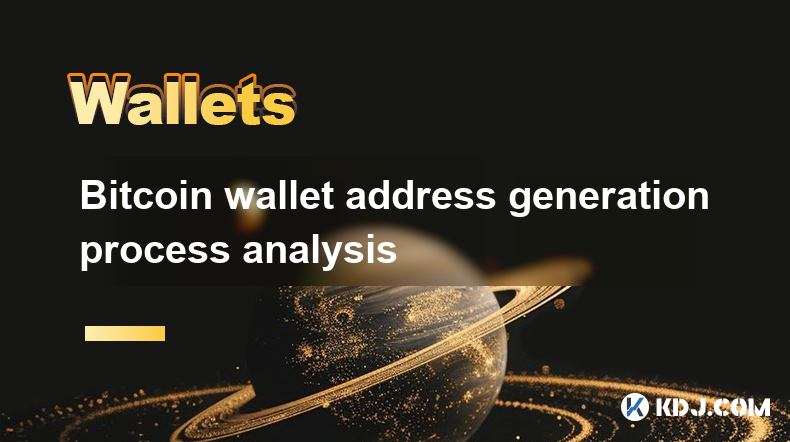
Understanding Bitcoin Wallet Addresses
A Bitcoin wallet address is a unique identifier, similar to a bank account number, used to receive and send Bitcoin. It's crucial to understand that this address doesn't directly store your Bitcoin; instead, it points to a public key associated with a private key. The private key is what gives you control over your Bitcoin. Losing your private key means losing access to your funds permanently. The generation process ensures the uniqueness and security of these addresses.
The Role of Elliptic Curve Cryptography (ECC)
At the heart of Bitcoin address generation lies ECC. This cryptographic system uses complex mathematical functions to create a secure link between public and private keys. ECC is chosen for its efficiency and security, making it suitable for cryptographic operations within a blockchain environment. It allows for the generation of strong cryptographic keys with relatively short lengths. The security of the entire system relies heavily on the strength of ECC.
Generating a Bitcoin Private Key
The first step involves generating a random number. This number forms the basis of your private key. This randomness is paramount; any predictability compromises the security of your Bitcoin. High-quality random number generators (RNGs) are essential to ensure the unpredictability of private keys. Weak RNGs can lead to vulnerabilities and potential theft.
Deriving the Public Key
Once the private key is generated, it undergoes a series of mathematical operations using the ECC algorithm. These calculations produce the corresponding public key. The public key is derived deterministically from the private key; meaning, the same private key will always yield the same public key. This public key is not secret and can be shared publicly.
Hashing the Public Key
The public key, while not directly your Bitcoin address, is used to generate it. It's first hashed using a cryptographic hash function, such as SHA-256. This function takes the public key as input and produces a fixed-size output, regardless of the input size. Hashing ensures that even a slight change in the public key drastically alters the hash output.
Base58 Encoding
The result of the hashing process is then encoded using Base58 encoding. This encoding scheme is specifically designed for Bitcoin addresses, converting the raw hash data into a human-readable alphanumeric string. Base58 avoids characters that look similar (like 0 and O, or 1 and l), reducing the risk of errors during manual entry. Base58 encoding makes the address easier to handle and less prone to transcription errors.
Adding Checksum for Error Detection
Before finalizing the address, a checksum is added. This is a small piece of data derived from the hashed public key, acting as an error detection mechanism. The checksum helps to detect errors during transmission or data corruption, ensuring the integrity of the address. If the checksum doesn't match, it indicates a potential problem with the address.
The Final Bitcoin Address
After Base58 encoding and checksum addition, the final Bitcoin address is generated. This is the string of alphanumeric characters you'll use to receive Bitcoin. This address is publicly available and can be shared without compromising your private key. However, remember that revealing your private key will allow others to access and spend your Bitcoin.
Different Types of Bitcoin Addresses
Several address formats exist, each with its own advantages and disadvantages. These include legacy addresses (P2PKH), SegWit addresses (bech32), and nested SegWit addresses (P2SH-SegWit). Understanding these differences is crucial for optimizing transaction fees and security. Newer address formats generally offer improved efficiency and security.
Software and Hardware Wallets
Bitcoin wallets, whether software or hardware, handle the address generation process internally. You don't need to manually perform these steps. Using reputable wallets is crucial to ensure the security and proper generation of your addresses. Hardware wallets offer the highest level of security by keeping your private keys offline.
Security Best Practices
- Always use strong, unpredictable passwords.
- Keep your private keys offline and secure.
- Use reputable and well-maintained wallets.
- Regularly back up your wallet and private keys.
- Be wary of phishing scams and malicious software.
Frequently Asked Questions
Q: Can I generate a Bitcoin address manually?
A: While technically possible, it's extremely complex and risky. Using specialized software or a reputable wallet is strongly recommended.
Q: Is it possible to reverse-engineer a Bitcoin address to find the private key?
A: No, the cryptographic functions used are designed to be one-way functions. It's computationally infeasible to derive the private key from the public address.
Q: What happens if I lose my private key?
A: You lose access to your Bitcoin. There's no way to recover it without the private key. This highlights the critical importance of securely storing your private keys.
Q: Are all Bitcoin addresses equally secure?
A: Newer address formats like bech32 generally offer better security and efficiency compared to older legacy addresses.
Q: How often should I generate new Bitcoin addresses?
A: It's generally good practice to use a new address for each transaction to enhance privacy and security. Many wallets automatically generate new addresses for each transaction.
Q: Can I reuse a Bitcoin address?
A: Yes, you can reuse a Bitcoin address. However, reusing addresses can compromise your privacy as it links your transactions together.
Q: What is the difference between a public and private key?
A: The public key is like your account number, which you can share publicly to receive funds. The private key is like your password, which gives you exclusive control over your Bitcoin. Never share your private key.
Q: What is a checksum in the context of a Bitcoin address?
A: A checksum is a small piece of data added to the address to detect errors and ensure the integrity of the address. It helps prevent typos and accidental data corruption from rendering the address unusable.
Q: What is Base58 encoding?
A: Base58 encoding is a method to convert the raw hash data into a human-readable alphanumeric string, making the Bitcoin address easier to handle and less prone to transcription errors. It avoids characters that may be easily confused.
Disclaimer:info@kdj.com
The information provided is not trading advice. kdj.com does not assume any responsibility for any investments made based on the information provided in this article. Cryptocurrencies are highly volatile and it is highly recommended that you invest with caution after thorough research!
If you believe that the content used on this website infringes your copyright, please contact us immediately (info@kdj.com) and we will delete it promptly.
- What is Lightchain AI?
- 2025-04-10 15:35:13
- The crypto scene just keeps heating up, and it seems like every other week there’s a new headline-grabbing update shaking up the markets.
- 2025-04-10 15:35:13
- World Liberty Financial (WLFI) Launches USD1 Stablecoin on BNB Chain
- 2025-04-10 15:30:13
- Bitcoin’s recent relief rally, which took the original cryptocurrency to a two-week high on Monday (Mar 24), is at risk of being short-lived
- 2025-04-10 15:30:13
- XRP (XRP/USD) Bucks Declines in Other Large-Cap Cryptos, Surging 17% YTD
- 2025-04-10 15:25:13
- President Donald Trump Has Expanded His Involvement in the Cryptocurrency World with the Launch of a New Stablecoin
- 2025-04-10 15:25:13
Related knowledge
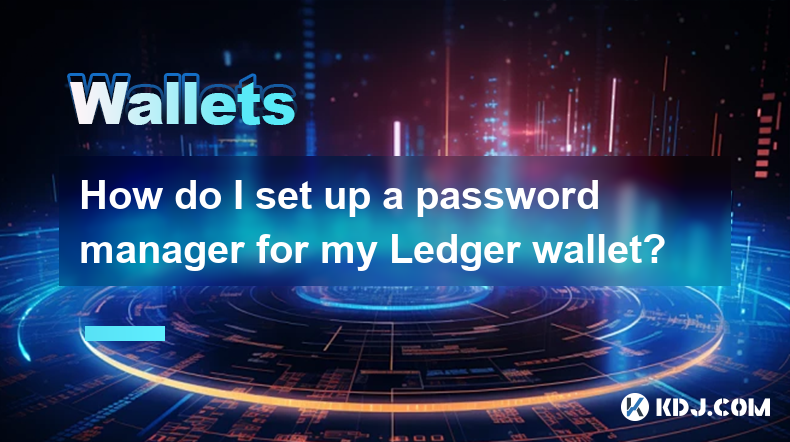
How do I set up a password manager for my Ledger wallet?
Apr 10,2025 at 11:50am
Setting up a password manager for your Ledger wallet is an essential step in enhancing the security of your cryptocurrency assets. A password manager helps you generate, retrieve, and keep track of complex passwords, ensuring that your Ledger wallet remains secure. In this article, we will guide you through the process of setting up a password manager s...
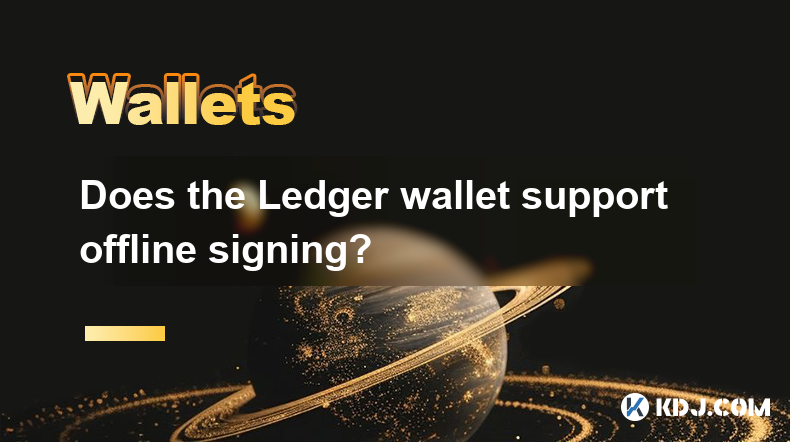
Does the Ledger wallet support offline signing?
Apr 09,2025 at 04:49am
Introduction to Ledger Wallet and Offline SigningThe Ledger wallet is a popular hardware wallet used by cryptocurrency enthusiasts to securely store their digital assets. One of the key features that users often inquire about is offline signing. Offline signing, also known as cold signing, is a security measure that allows users to sign transactions wit...

How do I export my Ledger wallet's transaction history?
Apr 10,2025 at 10:15am
Exporting your Ledger wallet's transaction history can be a crucial step for managing your cryptocurrency assets effectively. Whether you need this data for tax purposes, portfolio tracking, or simply for record-keeping, understanding how to access and export this information is essential. In this article, we will guide you through the process of export...
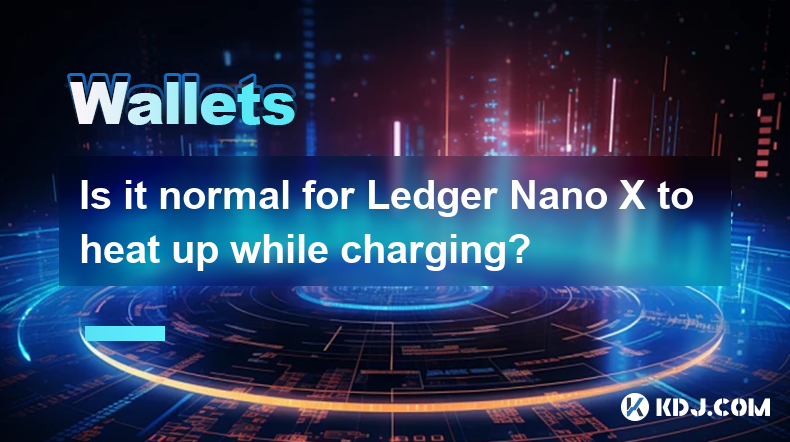
Is it normal for Ledger Nano X to heat up while charging?
Apr 09,2025 at 04:01pm
Is it normal for Ledger Nano X to heat up while charging? When using a hardware wallet like the Ledger Nano X, it's common for users to have concerns about the device's behavior, especially when it comes to heat generation during charging. This article will delve into the reasons behind the Ledger Nano X heating up while charging, whether it's normal, a...
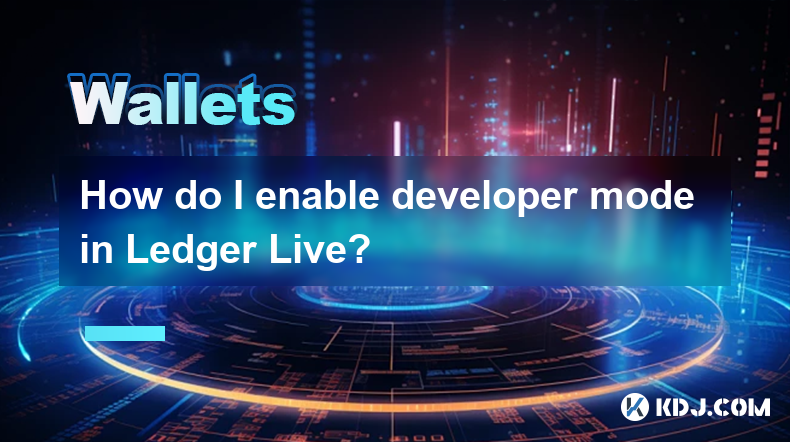
How do I enable developer mode in Ledger Live?
Apr 10,2025 at 05:49am
Enabling developer mode in Ledger Live can be a useful feature for advanced users who want to access experimental features or test new functionalities. This guide will walk you through the process of enabling developer mode in Ledger Live, ensuring you understand each step thoroughly. Understanding Developer ModeDeveloper mode in Ledger Live allows user...
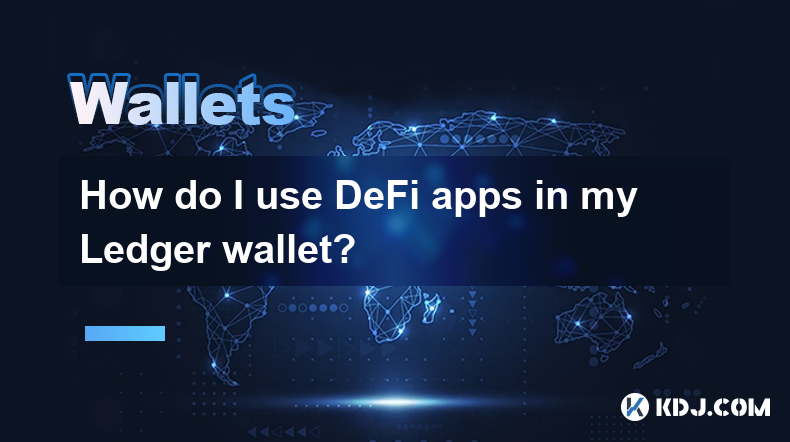
How do I use DeFi apps in my Ledger wallet?
Apr 10,2025 at 11:28am
Using DeFi apps with your Ledger wallet allows you to interact with decentralized finance platforms securely. This guide will walk you through the process of setting up and using DeFi apps with your Ledger device, ensuring your assets remain safe while you explore the world of DeFi. Setting Up Your Ledger Wallet for DeFiBefore you can use DeFi apps with...

How do I set up a password manager for my Ledger wallet?
Apr 10,2025 at 11:50am
Setting up a password manager for your Ledger wallet is an essential step in enhancing the security of your cryptocurrency assets. A password manager helps you generate, retrieve, and keep track of complex passwords, ensuring that your Ledger wallet remains secure. In this article, we will guide you through the process of setting up a password manager s...

Does the Ledger wallet support offline signing?
Apr 09,2025 at 04:49am
Introduction to Ledger Wallet and Offline SigningThe Ledger wallet is a popular hardware wallet used by cryptocurrency enthusiasts to securely store their digital assets. One of the key features that users often inquire about is offline signing. Offline signing, also known as cold signing, is a security measure that allows users to sign transactions wit...

How do I export my Ledger wallet's transaction history?
Apr 10,2025 at 10:15am
Exporting your Ledger wallet's transaction history can be a crucial step for managing your cryptocurrency assets effectively. Whether you need this data for tax purposes, portfolio tracking, or simply for record-keeping, understanding how to access and export this information is essential. In this article, we will guide you through the process of export...

Is it normal for Ledger Nano X to heat up while charging?
Apr 09,2025 at 04:01pm
Is it normal for Ledger Nano X to heat up while charging? When using a hardware wallet like the Ledger Nano X, it's common for users to have concerns about the device's behavior, especially when it comes to heat generation during charging. This article will delve into the reasons behind the Ledger Nano X heating up while charging, whether it's normal, a...

How do I enable developer mode in Ledger Live?
Apr 10,2025 at 05:49am
Enabling developer mode in Ledger Live can be a useful feature for advanced users who want to access experimental features or test new functionalities. This guide will walk you through the process of enabling developer mode in Ledger Live, ensuring you understand each step thoroughly. Understanding Developer ModeDeveloper mode in Ledger Live allows user...

How do I use DeFi apps in my Ledger wallet?
Apr 10,2025 at 11:28am
Using DeFi apps with your Ledger wallet allows you to interact with decentralized finance platforms securely. This guide will walk you through the process of setting up and using DeFi apps with your Ledger device, ensuring your assets remain safe while you explore the world of DeFi. Setting Up Your Ledger Wallet for DeFiBefore you can use DeFi apps with...
See all articles





















































































